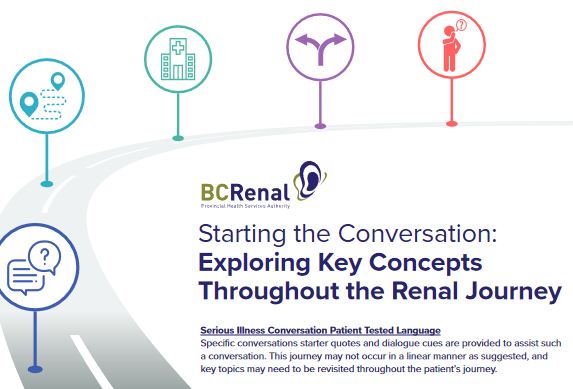
The Serious Illness Conversation Guide is one of several tools in the toolbox described in BC Renal's patient goal-setting strategy. Each tool is aimed at helping patients and care teams work together to identify what's important to patients in their care and well-being and support them in setting goals that matter most to them.
The purpose of the Serious Illness Conversation Guide is to be a communications tool for health professionals to guide advance care planning conversations with patients using a structured format. As a tool, it helps:
- build trust between health professionals and the patient,
- understand the patient preference,
- share information about the illness, and
- explore key things important to the patient, e.g., fears and worries, goals in life.
"The Serious Illness Conversation Guide is a uniquely helpful tool, developed using input from individuals with life-limiting illness, which aids clinicians in discussing goals of care with patients and their families," says Dr. Gaylene Hargrove, chair of BC Renal's provincial palliative care committee. "Integrating serious illness conversations into routine care enables clinicians to understand what matters most to their patients and fosters relationship-building between care providers and their patients. The guide provides the platform on which multi-disciplinary clinicians and their patients can engage in advance care planning, and all parties feel supported in the process."
The guide has seven steps and expands on each step, providing examples:
- Set up the conversation
- Assess understanding and preferences
- Share prognosis
- Explore key topics
- Close the conversation
- Document the conversation
- Communicate with key clinicians
Step 4 is about asking the patient about their goals: 'What are your most important goals if your health situation worsens?'
When is the 'right' time to start the conversation? There are times along the patient journey when health professionals may find it particularly helpful to start a conversation, especially related to these key events:
- Choosing a treatment option with chronic kidney disease
- Dialysis initiation
- Post-hospitalization/dialysis complications
- Dialysis access issues
- Dialysis withdrawal consideration
Starting the Conversation: Exploring Key Concepts Throughout the Renal Journey is a one-page infographic that provides questions you may find helpful to ask along the way. Serious illness conversations can be iterative and non-linear, so feel free to start, continue or revisit them as needed.
All of our resources are available on the BC Renal website in the Health Professionals section on the Palliative Care page. Look for the Serious Illness Conversation Guide menu item to access them. The Serious Illness Care Program Reference Guide for Interprofessional Clinicians is another resource you can access there or directly via the link we've provided here.
The course, Serious Illness Care: More, Earlier, Better Conversations, is available for clinicians who are interested in training related to the Serious Illness Conversation Guide. Visit https://learninghub.phsa.ca/ and enter the search term 'serious illness.'
Two resources, developed by BC Renal in partnership with the BC Centre for Palliative Care, are available in the Health Info section of the BC Renal website on the Palliative Care page under the menu item, Serious Illness Conversation Guide. You can also access them directly here:
Talking with your clinician about the future
Talking about your illness with loved ones and caregivers
Additional patient resources:
Having a Voice wallet card
New: What Matters Most to Me worksheet
At LivingMyCulture.ca, you will find a number of tools to support culturally safe care for having advance care planning and palliative care discussions with people from various cultural backgrounds—Indigenous, Chinese, South Asian, Italian and more. They include stories and wisdom about living with advanced illnesses, end of life and bereavement.
New to the platform is free online Indigenous cultural safety training to help improve the quality of care for Indigenous peoples and their families living with advanced illness.
